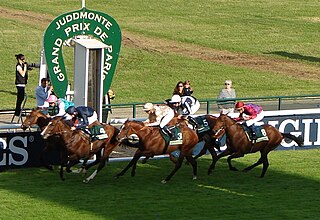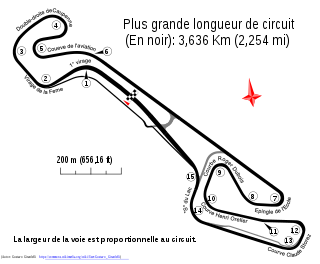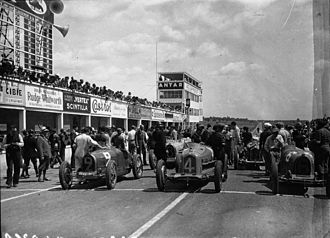
The Prix de l'Arc de Triomphe is a Group 1 flat horse race in France open to thoroughbreds aged three years or older. It is run at Longchamp Racecourse in Paris, France, over a distance of 2,400 metres and scheduled to take place each year, usually on the first Sunday in October.

Raymond Pierre Sommer was a French motor racing driver. He raced both before and after WWII with some success, particularly in endurance racing. He won the 24 Hours of Le Mans endurance race in both 1932 and 1933, and although he did not reach the finishing line in any subsequent appearance at the Le Mans, he did lead each event until 1938. Sommer was also competitive at the highest level in Grand Prix motor racing, but did not win a race. He won the French Grand Prix in 1936, but the event that year was run as a sports car race. After racing resumed in the late 1940s, Sommer again won a number of sports car and minor Grand Prix events, and finished in fourth place in the 1950 Monaco Grand Prix, the second round of the newly-instituted Formula One World Drivers' Championship. He was killed toward the end of 1950, when his car overturned during a race at the Circuit de Cadours.

The French Grand Prix, formerly known as the Grand Prix de l'ACF, is an auto race held as part of the Fédération Internationale de l'Automobile's annual Formula One World Championship. It is one of the oldest motor races in the world as well as the first "Grand Prix". It ceased, shortly after its centenary, in 2008 with 86 races having been held, due to unfavourable financial circumstances and venues. The race returned to the Formula One calendar in 2018 with Circuit Paul Ricard hosting the race.
Grand Prix motor racing, a form of motorsport competition, has its roots in organised automobile racing that began in France as early as 1894. It quickly evolved from simple road races from one town to the next, to endurance tests for car and driver. Innovation and the drive of competition soon saw speeds exceeding 100 miles per hour (160 km/h), but because early races took place on open roads, accidents occurred frequently, resulting in deaths both of drivers and of spectators. A common abbreviation used for Grand Prix racing is "GP" or "GP racing".

The 2003 French Grand Prix was a Formula One motor race held on 6 July 2003 at the Circuit de Nevers Magny-Cours. It was the tenth race of the 2003 Formula One season. The 70-lap race was won by Ralf Schumacher driving for the Williams team after starting from pole position, which would turn out to be his last race win in Formula One. Juan Pablo Montoya finished second in the other Williams car, with Michael Schumacher third driving for Ferrari. Ralf Schumacher's victory was his second consecutive win of the season having won the preceding European Grand Prix at the Nürburgring.

The 2004 French Grand Prix was a Formula One motor race held on 4 July 2004 at the Circuit de Nevers Magny-Cours. It was Race 10 of 18 in the 2004 FIA Formula One World Championship. This race has become famous for a 4 stop strategy used by Michael Schumacher to beat Fernando Alonso's Renault. Rubens Barrichello finished third in his Ferrari, having overtaken Jarno Trulli in the last corners of the last lap.

Dijon-Prenois is a 3.801 km (2.362 mi) motor racing circuit located in Prenois, near Dijon, France. The undulating track is noted for its fast, sweeping bends.

The circuit Reims-Gueux was a Grand Prix motor racing road course, located in Gueux, 7.5 km west of Reims in the Champagne region of north-eastern France, established in 1926 as the second venue of the Grand Prix de la Marne. The triangular layout of public roads formed three sectors between the villages of Thillois and Gueux over the La Garenne / Gueux intersection of Route nationale 31. The circuit became known to be among the fastest of the era for its two long straights allowing maximum straight-line speed, resulting in many famous slipstream battles.

The 2005 French Grand Prix was a Formula One motor race held on 3 July 2005 at the Circuit de Nevers Magny-Cours near Magny-Cours in France. It was the tenth race of the 2005 FIA Formula One World Championship. The 70-lap race was won from pole position by Fernando Alonso, driving a Renault, with Drivers' Championship rival Kimi Räikkönen finishing second in a McLaren-Mercedes and Michael Schumacher third in a Ferrari.

The Grand Prix de Paris is a Group 1 flat horse race in France open to three-year-old thoroughbred colts and fillies. It is run at Longchamp over a distance of 2,400 metres, and it is scheduled to take place each year in July.

Haras de Meautry in Touques, Calvados, Normandy, France, is a thoroughbred horse breeding farm. It was acquired in the 19th century by horse-racing enthusiast Alphonse James de Rothschild (1827–1905) who passed it down to his offspring so that today it is in the hands of Édouard de Rothschild.

Hippodrome Deauville-La Touques is a race track for thoroughbred horse racing located in Deauville in the Calvados département, in the Normandy région of France. Originally called Hippodrome de la Touques, it was named for the Touques River that separates the city of Deauville from Trouville-sur-Mer. It was constructed in 1862 by Charles Auguste Louis Joseph, duc de Morny, the half brother of Napoleon III.

The 2006 French Grand Prix was a Formula One motor race held at the Circuit de Nevers Magny-Cours, near Magny-Cours, France on 16 July 2006. The 70-lap race was the eleventh round of the 2006 Formula One season, the 57th French Grand Prix as part of the World Championship, and the 92nd overall. This race also marked the centenary of the first French Grand Prix in 1906.

The Pau Grand Prix is a motor race held in Pau, in the Pyrénées-Atlantiques department of southwestern France. The French Grand Prix was held at Pau in 1930, leading to the annual Pau Grand Prix being inaugurated in 1933. It was not run during World War II and in 2020–2021 due to the COVID-19 pandemic.

Circuit Paul Armagnac also known as Circuit de Nogaro is a motorsport race track located in the commune of Nogaro in the Gers department in southwestern France. The track is named in honor of Nogaro-born racing driver Paul Armagnac who died in an accident during practice for the 1962 1000 km de Paris at the Montlhéry circuit.

Chantilly Racecourse is a Thoroughbred turf racecourse for flat racing in Chantilly, Oise, France, about 50 kilometres (31 mi) north of the centre of the city of Paris.

The 3rd Reims Grand Prix was a Formula One motor race, held on July 1, 1962, at the Reims-Gueux circuit, near Reims in France. The race was run over 50 laps of the 8.302 km circuit and was won by New Zealand driver Bruce McLaren in a Cooper T60.

The 12 Hours of Reims were a sports car endurance racing series held in 1965 at the circuit Reims (Gueux).

The 12 Hours of Reims were a sports car endurance racing series held from 1953 to 1967 at the circuit Reims (Gueux). The start of the race was at midnight in "LeMans style" with the cars lined up in order of their fastest practice times.

Charles Pierre Elie Montier was a French racing driver and automotive engineer whose race entries included the inaugural 24 Hours of Le Mans.















